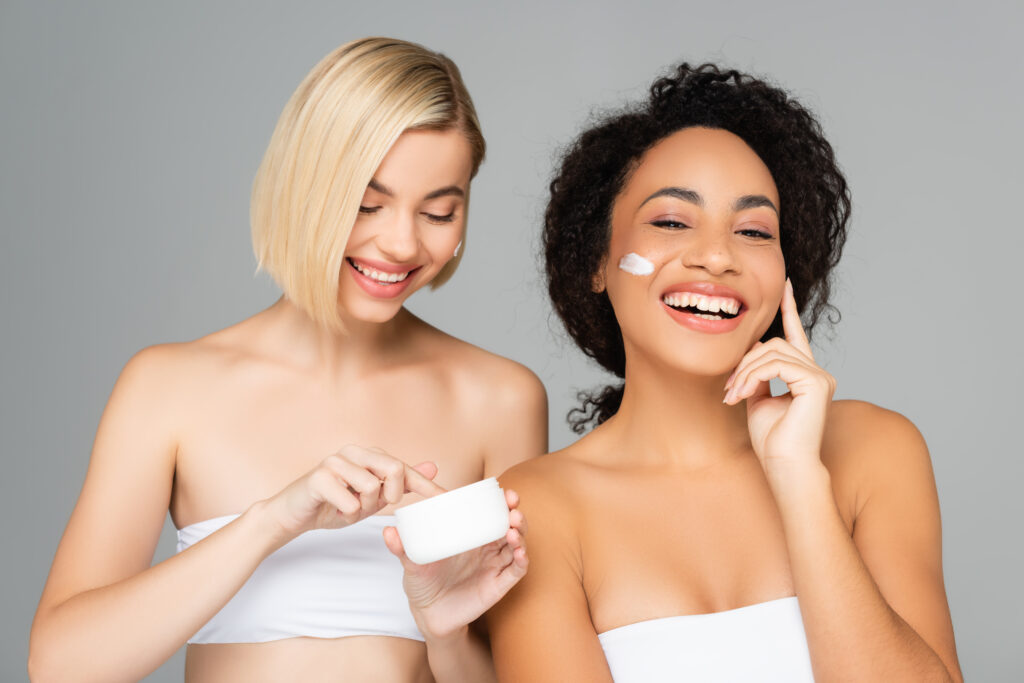
Retinoids are holy grail products for all skin types. Whether you are battling acne, wrinkles, enlarged pores, dull skin, or hyperpigmentation, a good retinoid is what you need! Topical retinoids have been transforming complexions for decades and are renowned for their anti-aging properties. In this article, you will learn about the power of retinoids and how to use them. You will also learn the difference between retinol, retinaldehyde, and retinoic acid.
What are retinoids?
Retinoids are vitamin A derivatives classified into retinol, retinaldehyde, and retinoic acid. Retinoids boast a remarkable ability to turn back the clock on your skin. Retinol and retinaldehyde can be found over the counter. However, retinoic acid can only be prescribed by a physician.
What do retinoids do?
Retinoids tackle a little bit of everything when it comes to skincare routines. Retinoids stimulate collagen production, helping to reduce fine lines and wrinkles. They promote healthy cell turnover, unveiling fresh, radiant skin. Retinoids can fade dark spots and even out skin tone. Say goodbye to acne! Retinoids are great for unclogging pores and clearing and preventing breakouts.
The Retinoid Family : Retinol, Retinaldehydes, and Retinoic Acids
You must find the perfect retinoid for you and your skin type to get the most benefits.
Retinol is a milder form of vitamin A. It needs to be converted into retinoic acid by your skin before it becomes active. It’s great for beginners and those with sensitive skin.
Retinoic acids are more potent versions of vitamin A, available by prescription (e.g., Tretinoin, Retin-A, Tazarotene, Altreno, Adapalene). Prescription retinoids work more quickly but can be harsher on the skin. They are commonly prescribed to treat acne and pseudofolliculitis barbae.
Retinaldehydes are a middle ground between retinol and retinoic acids. They are potent and more easily absorbed by the skin, making them effective without as much irritation.
Potential Side Effects
Retinoids can cause itching, pain, peeling, irritation, and redness. If these side effects occur, you should contact your dermatologist.
How To Use Retinoids Effectively
Now, let’s talk about the best way to incorporate retinoids into your skincare routine.
Start Slow: Begin with a lower concentration to build tolerance. You should start by applying your it twice a week, then every other night, and then every night. This will minimize the irritation, dryness, and other potential side effects.
Nighttime Application: Retinol makes your skin more sensitive to the sun. You should apply it at night, right before bedtime, to avoid UV damage. Light from your cell phone, TV, and lamps can inactivate the retinoid.
Apply To a Clean and Dry Face: Before applying retinoids, you should cleanse your face with a foaming cleanser, which will remove all the products from your morning skincare routine. Then, pat your face with a clean towel until it is dry.
Pea-Sized Amount: A little goes a long way. Use a pea-sized amount for your entire face when applying a prescription retinoid. For an over-the-counter retinoid, you should follow the directions on the package.
Follow with Moisturizer: After applying the retinoid to your face, use a gentle, hydrating moisturizer to reduce potential dryness and irritation. Look for ingredients that contain niacinamide, lipids, and ceramides to minimize irritation.
Sunscreen is a Must: Always wear SPF to protect your renewed skin from UV damage during the day. When it comes to sunscreen, the higher the SPF, the better.
Have Patience: It can take 3-6 months to see results, but the results will be worth the wait!
Do Not Use If Trying to Conceive or If You Are Pregnant: Exposure to high amounts of vitamin A is linked to severe birth defects. If you are pregnant or trying to conceive, you should avoid retinoids.
Conclusion
Retinoids are game-changers in the skincare world, but it’s crucial to understand their variations and use them correctly. Whether you choose retinol, retinaldehydes, or retinoic acids, consistency and patience are key. As with any skincare product, consult with a dermatologist for personalized advice. Get ready to unlock the secret to radiant, youthful skin with the power of retinoids!
